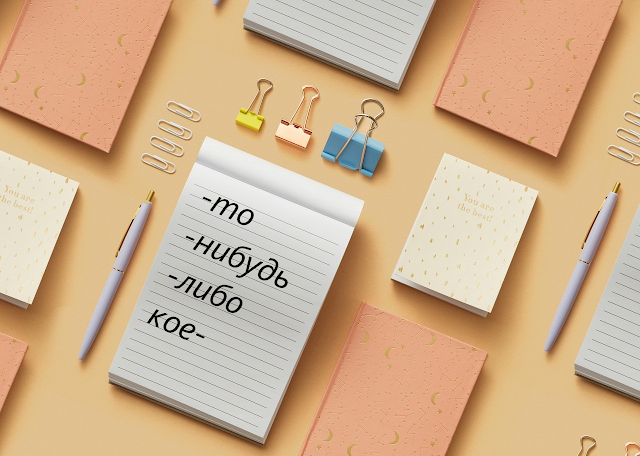In Russian, there are several options for showing uncertainty.
One of them is to use indefinite particles of '-то', '-нибудь', '-либо' and 'кое-'.
For example, 'куда́-нибудь' or 'куда́-то', or maybe 'куда́-либо' or'кое-куда́'.
Let's talk about the difference between these particles.
Exercises:
For example, 'куда́-нибудь' or 'куда́-то', or maybe 'куда́-либо' or'кое-куда́'.
Let's talk about the difference between these particles.
- Particles '-то', '-нибудь', '-либо' are placed after pronouns or adverbs:
кто-нибу́дь, где́-нибудь, когда́-нибудь...
кто-ли́бо, где́-либо, когда́-либо...
- Particle 'кое-' should be put before pronouns or adverbs:
- Words with particles change in cases in the same way as without these particles:
кому́-нибу́дь, с кем-нибу́дь, како́го-нибу́дь...
кому́-ли́бо, с кем-ли́бо, каки́х-ли́бо...
ко́е-кому́, кое-каки́м...
- By the way, all words with these particles are always written with a hyphen. But if the words are with the particle 'кое-' are used with prepositions, then prepositions will be after the particle and therefore the hyphen is not written:
Particle '-ТО'
indicates uncertainty for the speaker, that is, the speaker does not know the information or he does not exactly remember what is being discussed:
Ты не по́мнишь, я вчера́ с кем-то говори́л?
(Do you remember with whom I spoke yesterday?)
Ка́жется, кто-то звони́л вам вчера́.
(Someone called you yesterday.)
Ду́маю, я где́-то уже́ ви́дела э́ту карти́ну. Но, вот, где?
(I think I’ve already seen this picture somewhere. But where?)
Often in a speech, Russians can replace the particle '-то' with the words "не помню" ("I don't remember") or "не знаю" ("I don't know").
Particles '-НИБУДЬ' or'-ЛИБО'
indicates uncertainty in the choice or lack of information from the speaker, as well as indifference in the choice:
Дай мне уже́ что-нибу́дь пое́сть.
(Give me something to eat.)
Я обяза́тельно сего́дня куда́-нибудь пойду́.
(I am sure to go somewhere today.)
Пусть кто-нибу́дь из вас даст мне пра́вильный отве́т.
(May one of you give me the correct answer.)
Вы́берите како́й-ли́бо фрагме́нт из нау́чного те́кста...
(Choose any fragment from the scientific text...)
Often in a speech, Russians can replace the particles '-нибудь' and '-либо' with the words "не важно" ("Doesn't matter"), "всё равно" ("Anyway"), "не имеет значения" ("Doesn't matter").
Particles '-либо' and '-нибудь' are synonymous. But there is one small difference - style.
Words with a particle '-либо' are used more often in book speech, and words with a particle '-нибудь' are used in both book and colloquial speech.
Particle 'КОЕ-'
used when the speaker knows the information, but doesn’t specifically speak about or does not want to specify details for the interlocutor:
Я тебе́ ко́е-что купи́ла на день рожде́ния.
(I bought you something for Christmas.)
Сего́дня я ко́е с кем встре́чусь. Догада́ешься с кем?
(Today will meet with someone. Guess who?)
Мне ну́жно сказа́ть тебе́ ко́е-что по секре́ту.
(I need to tell you something secret.)
Often in a speech, Russians can replace the particle 'кое-' with the words "не скажу" ("I will not say"), "это секрет" ("It's secret").
It's interesting, the particle '-нибудь' is often used with the verbs of the future tense and in the imperative, as well as in interrogative sentences.
Important:
- когда-то = long time ago, once
Когда́-то на земле́ жи́ли диноза́вры.
(Once upon a time, dinosaurs lived on earth.)
- когда-нибудь = not soon in the future, some day, ever
Мы когда́-нибудь обяза́тельно встре́тимся.
(We will meet sometime.)
- кое-как = badly, hardly
Сего́дня он рабо́тает кое-ка́к.
(Today he works a little bit.)
Conclusion: Particles '-то', '-нибудь', '-либо' and 'кое-' indicate uncertainty. Each particle denotes something of its own. So,
'-то' can be replace with the words "не помню" ("I don't remember") or "не знаю" ("I don't know"),
'-нибудь' or '-либо' can be replace with the words "не важно" ("Doesn't matter"), "всё равно" ("Anyway"), "не имеет значения" ("Doesn't matter"),
'кое-' can be replace with the words "не скажу" ("I will not say"), "это секрет" ("It's secret").
1. Choose '-то', '-нибудь' or 'кое-'.
Дай мне почитать (какой) книгу.
Вчера о тебе (кто) спрашивал. Он сказал, что учился с тобой в школе.
В воскресенье мы с тобой (куда) поедем. Это будет сюрприз.
Нельзя сидеть целый день дома. Надо (куда) сходить погулять.
Думаю, у тебя (какие) проблемы с визой.
Он приехал (откуда) с севера России.
2. What particle is better to use in these situations:
- Сегодня он хочет отдохнуть.
- Он мне говорил, где будет отдыхать в июле, но я забыла где.
- Он обязательно поедет отдыхать летом, но ещё не решил куда.
- Он купил билеты на море, но не сказал мне.
- Она ждёт друга, но я его ещё не знаю.
3. Put the words in the brackets in the correct form.
Model: Я хочу тебя кое- (кто) познакомить.
Я хочу тебя кое с кем познакомить.
К нему пришёл (какой) -то странный человек.
(Кто) -то это кажется интересным, но только не мне.
Этот подарок для кое- (кто) из наших друзей.
Тебе обязательно надо (кто) -то спросить совета.
Дай мне (что) -нибудь вкусное. Я очень голодная.
Ко мне (кто) -нибудь приходил сегодня?
Я довольно всеми своими учениками: (кто) -то больше, а (кто) -то меньше.
Picture from pexels.com.
👉
Russian


No comments:
Post a Comment